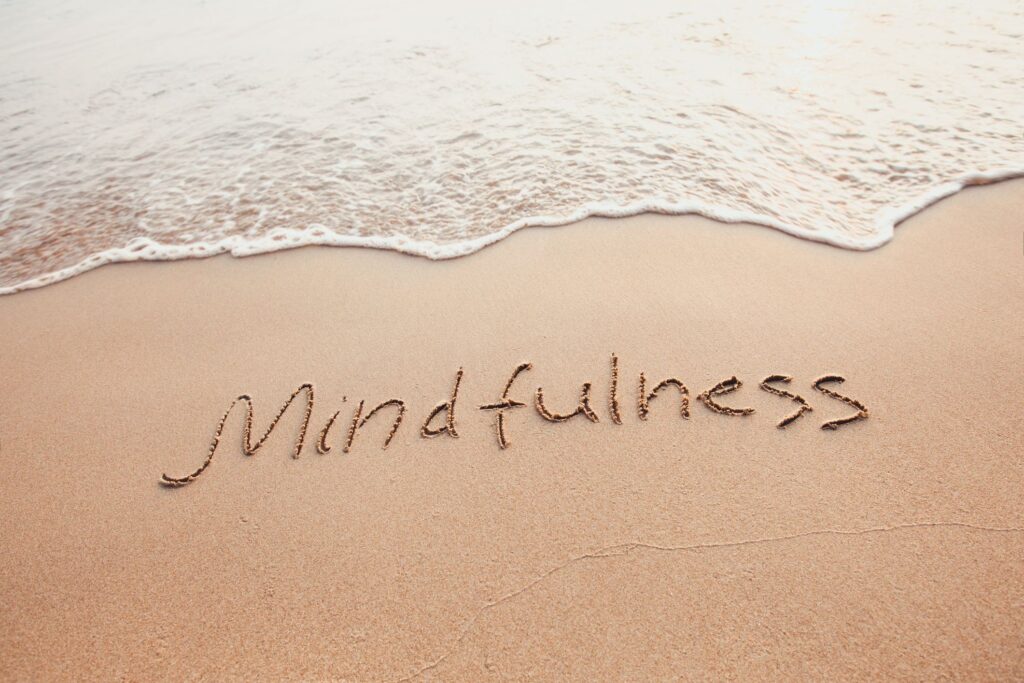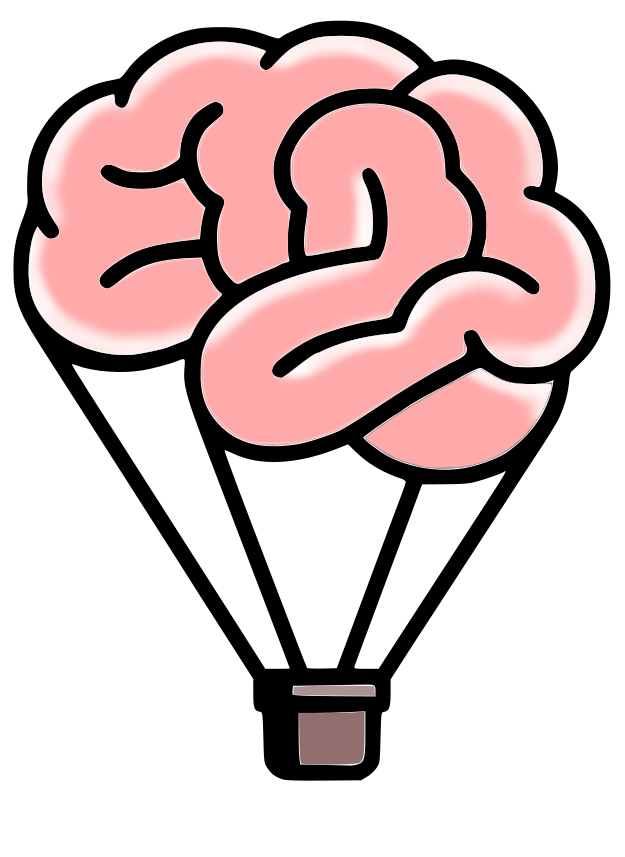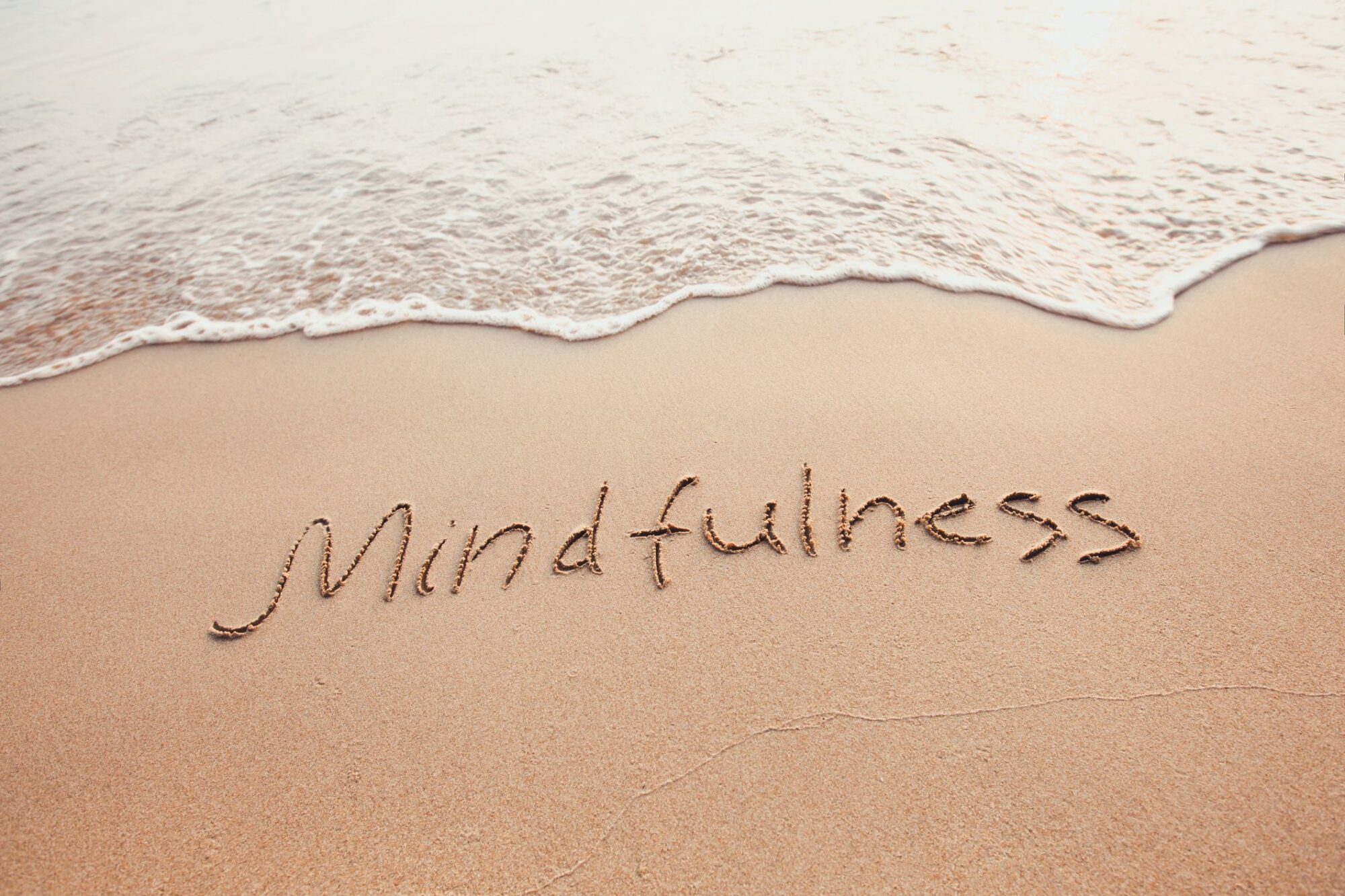Have you been hearing a lot about mindfulness and mindfulness-based meditation lately? I have! But what are these things? Are they the same or entirely different? And what do we get when we combine the two? At the end of this post, I will also address a real concern / question: is the popularity of these tools overblown?
Mindfulness is a state of being fully present in the moment, paying attention to any sensory input in your immediate experience.

First, what is mindfulness? Mindfulness is the state of being fully present in the moment, paying attention to any sensory input in your experience—the five senses plus the sixth sense door, noticing thoughts as something that can be mindfully attended to. Ideally, mindful attention occurs without judgment, maintaining a moment-by-moment awareness of thoughts, feelings, bodily sensations, and surrounding environment, through a gentle, nurturing lens that is open and accepting.
Second, what is meditation? Meditation often takes the awareness found in mindfulness and turns it into a practice of focusing the mind on a particular object, thought, or activity with an intention of achieving a certain outcome—for our purposes these outcomes are Focus, Clarity, Equanimity, and Kindness.

Meditation often takes the awareness found in mindfulness and turns it into a practice of paying attention to a particular object, thought, or activity with an intention of achieving a certain outcome—for our purposes this outcome is Focus, Clarity, Equanimity, and Kindness.
There is a great deal of overlap between mindfulness and meditation, but mindfulness does not equal meditation. It is entirely possible to be very mindful/present, but not meditative. A commonly used example of mindfulness without meditation is peak performance, or finding flow with an activity, think of a musician or athlete singularly focused on their performance. Where meditation would distract from peak performance, mindfulness is absolutely necessary for achieving flow.
So, mindfulness ≠ meditation (see the Russ Harris video linked below for more on this).
However, vipassana style meditation includes mindfulness. The difference between meditation and mindfulness is found in: 1) with meditation there are formal practice elements of meditating, i.e., sitting, laying down, or walking, often closing the eyes et cetera to 2) achieve a desired cognitive and/or affective outcome. In the case of our work here at Liberated Mind we are working toward a stable state of mind fostering Focus, Clarity, Equanimity, and Kindness.
Why Focus, Clarity, Equanimity, and Kindness? Good question. First a definition of each:
Focus
In a general sense, “focus” refers to the center of conscious awareness; a point of concentration or directed attention.
Clarity
Clarity refers to the quality of being clear, discernible, understood.
Equanimity
Is defined as an even-minded mental state or dispositional tendency towards all experiences or objects, regardless of the origin or how they might tend to make us feel. This means that someone with equanimity would maintain a balanced mind and composure, wisely undisturbed by emotions, pain, or other experience.
Kindness
Is a state of being, an attitude or value often manifest through behavior. Kindness involves being generous, considerate, caring, and open towards oneself and things external to the self. Kindness is often expressed through kind deeds or acts of support. True kindness is characterized by a lack of expectation for praise or reward, i.e., altruism for altruism sake. And yes, I hear the cynic in the back-row snickering at the very suggestion.
Why are these four the core mission of Liberated Mind? Why not just the first three? That’s another great question! It is true that including “kindness” brings a form of evaluation to the practice. If this is not for you, we respect that, but given our commitment to our own values we would not be able to join you on a journey that uses mindfulness or meditation to achieve an outcome that isn’t centered (in some ways) on kindness. I’ll leave it at that, but if you are curious why we draw a line like this here at Liberated Mind, or are wondering about our rigid commitment to “kindness,” please see the Mediation Apps section of the Reading + Resource List for more on this specific point, with special interest paid to the follow readings we’ve shared on that page:
Link: When Meditation Makes You Generous (and When It Doesn’t)
Michael J. Poulin, Berkeley Greater Good Blog
Link: A Sniper’s “Mindfulness”
Matthieu RicardMindfulness is a tool for coming into the present moment and for unhooking from the automaticity of thinking. For our purposes, meditation makes use of the space created by mindfulness to then achieve Focus, Clarity, Equanimity, and Kindness. When these four combine, they create a stable state of mind that is a primary goal of our approach to psychotherapy.
Caveat worth noting: despite pop-culture suggestions otherwise, Mindfulness and even Meditation are not religious (typically thought of as Buddhist). Oh, sure, religions often includes contemplative practices as a part of worship, things like prayer, chants, mantras, singing, meditation, etc. But mindfulness and meditation are not inherently religious, despite the presence of these tools in religious spaces (check out Sam’s Big Think video at the bottom of our About page for more on this point).
Hopefully that clears up some of the differences between Meditation and Mindfulness?
But here’s the real point:
We’ve found mindfulness and meditation to be two of the very best tools for improving overall mental health and well-being. So, why not give them a try?
BUT! Is the popularity of these tools overblown?
In some ways, the answer to this question is: YES. Absolutely, yes. Full stop.
Mindfulness and meditation, neither of them are a cure-all, a panacea meant to fix all of life’s challenges. In fact, it’s possible that coming into the present moment will magnify some of the struggles (pain + suffering) a person faces. Example articles on this point: Example #1, Example #2, Example #3. Meditation and Mindfulness create space for the present moment, clearing the clutter of the mind, when this occurs it is important to address what is showing up. If worry, loneliness, sadness, anxiety, depression, frustration, anger, even happiness, joy, and so on are showing up, why are these things showing up when you are present? Mindfulness and meditation create the space to ask and answer that question.
Even in contemplative traditions making extensive use of meditation, for example in Buddhism mediation is only one part of the process toward finding liberation from painful states of being (for more on this point check out the eight-fold path of Buddhism).
Here at Liberated Mind, successful mediation includes Focus, Clarity, Equanimity, and Kindness but improvements in overall mental health require working on each item of the Liberated Mind Top 10 List: check out our Top 10 List by clicking here.
Here’s a bit more on the science behind how these tools help:
We use mindfulness because it has been shown to help treat the things we are here to support you with. In particular, mindfulness-based therapies, like Acceptance Commitment Therapy (ACT), one of our favorite tools here at Liberated Mind, can be particularly effective for reducing stress, anxiety, and depression¹. It can also help treat specific problems including depression, pain, smoking, and addiction¹. For instance, several studies have found that tools found in ACT can significantly reduce relapse in people who have had previous episodes of major depression¹.
(1) Mindfulness meditation: A research-proven way to reduce stress. https://www.apa.org/topics/mindfulness/meditation.
Randomized controlled trials (RCTs) have found that mindfulness meditation can have significant effects on various aspects of mental health.
A meta-analysis of RCTs on mindfulness-based interventions in healthy adults found an overall effect of g = 0.2, with significant effects on attention (g = 0.18) and executive control (g = 0.18), but not on working memory¹. The study also found that the number of in-class sessions modulated these effects: the more sessions, the stronger the effect¹.
Another RCT tested the effects of two popular mindfulness meditation apps (Headspace and Smiling Mind) on mental health among university students². The study found that users of these apps showed significant improvements in depressive symptoms, college adjustment, resilience (for Smiling Mind only), and mindfulness (for Headspace only) from baseline to the end of a 10-day period relative to control participants². Participants who continued to use the app frequently were more likely to maintain improvements in mental health until the end of a 30-day period².
(1) The Effects of Mindfulness Meditation on Attention, Executive Control …. https://link.springer.com/article/10.1007/s10608-020-10177-2.
(2) Mobile Mindfulness Meditation: a Randomized Controlled Trial of the …. https://link.springer.com/article/10.1007/s12671-018-1050-9.
—
This post does not constitute therapeutic counseling or advice; the contents of this post are provided as a learning resource. We share the contents hoping that if you are in need of mental health support you will reach out to us directly or to a mental health professional in your area.

